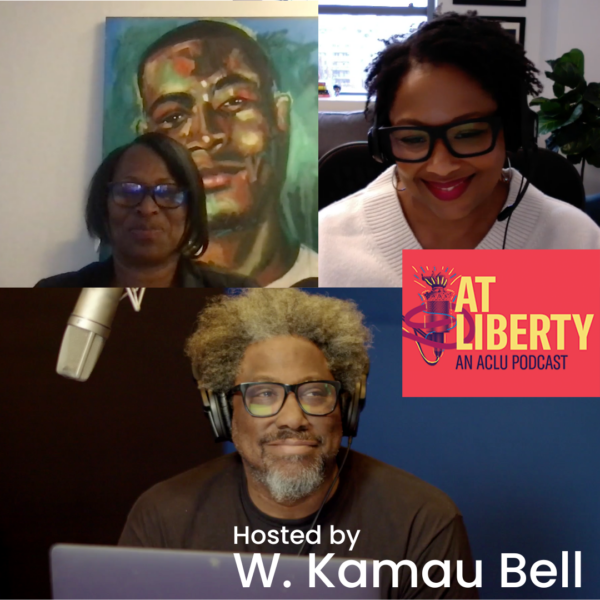
Jason Reynolds Is Creating a Literary Archive for the Next Generation
May 23, 2024
On this episode, "At Liberty" producer Vanessa Handy speaks with young adult and middle-grade literature author, Jason Reynolds. Though he writes for young audiences, Jason doesn't shy away from serious themes or challenges, with many of his books dealing with death, mourning, racism, police brutality, and gun violence. Jason writes the stuff of real life, and this has made him a superstar among young readers and adults alike.
He has penned numerous bestselling and award-winning books like “Look Both Ways: A Tale Told In Ten Blocks,” “Ghost,” “As Brave as You,” “Long Way Down,” and “All American Boys” with Brendan Kiely. He also used his gifts to promote literacy as the national ambassador for young people's literature from 2020 to 2022. Today, he joins us to discuss carrying on the tradition of Black storytelling and how we can all inspire young people to love literature.
This Episode Covers the Following Issues
Related Content
- PodcastApr 2025

Racial Justice
Know Your Right To Transportation Justice With Deborah Archer And Sister Helen Jones. Explore Podcast.Know Your Right To Transportation Justice with Deborah Archer and Sister Helen Jones
By: ACLU - Press ReleaseApr 2025

Racial Justice
Aclu Reacts To Updated Omb Guidance For Ai Use By Federal Agencies. Explore Press Release.ACLU Reacts to Updated OMB Guidance for AI Use by Federal Agencies
WASHINGTON — Today, the Trump administration released updated guidance from the Office of Management and Budget (OMB) on federal agencies' uses of artificial intelligence (AI). The updated guidance reaffirms that American leadership in AI depends on public trust, and emphasizes that AI systems used by the federal government must be safe, fair, and aligned with public interest. “Before using AI to decide who gets a job, mortgage, or federal benefits — and more — federal agencies must first make sure that AI is up to the task, fair, and safe — and discontinue it when it's not,” said Cody Venzke, senior policy counsel with the American Civil Liberties Union. “The new guidance recognizes that American leadership in AI means that AI must make efficient use of taxpayers' resources and work for the American people.” The updated guidance maintains several critical safeguards included in earlier guidance. Federal agencies are still required to perform pre-deployment testing, conduct impact assessments, and discontinue AI that is not sufficiently safe or fair. Ongoing monitoring, remedies and appeals, and human oversight also remain. The guidance covers AI that will affect some of the most critical areas of life like housing, education, employment, and government benefits — which the guidance calls “high-impact AI.” AI is increasingly being used across the federal government to make decisions about our lives, and the updated guidance will help ensure that AI is trustworthy and accountable. AI affects civil rights, civil liberties, and privacy is similarly covered. However, the updated guidance eliminates some key protections that previously supported transparency and civil rights enforcement. Express notice of adverse actions made by AI systems has been removed, weakening transparency for individuals impacted by automated decisions. “Moving forward, the ACLU will continue monitoring the implementation of the guidance and advocating for stronger guardrails where protections have been scaled back or AI poses new harms,” Venzke added. The updated guidance is available here and here. - Press ReleaseApr 2025

Racial Justice
Researchers Challenge Nih’s Politically Driven Grant Cancellations. Explore Press Release.Researchers Challenge NIH’s Politically Driven Grant Cancellations
BOSTON — Today, researchers, along with American Public Health Association (APHA), the International Union, United Automobile, Aerospace and Agricultural Implement Workers of America (UAW), and Ibis Reproductive Health filed a lawsuit challenging the abrupt cancellation of research grants by the National Institutes of Health (NIH), the world’s largest public funder of biomedical research. The grants were cancelled after NIH staff were directed to eliminate research on disfavored topics and populations without clear guidance or justification – jeopardizing critical medical discoveries that drive advancements in diagnosing, preventing, and treating life-threatening diseases. In February, the NIH began a reckless purge of federal grants, halting application processes midstream, and stripping funding opportunities from its website. Hundreds of research projects — many of which have been underway for years, representing thousands of hours of work and billions of dollars in investment — were abruptly cancelled without a scientifically valid explanation. “Ending these NIH grants wastes taxpayer money and years of hard work to answer the world's most pressing biomedical questions. This is an attack on scientific progress itself,” said plaintiff Dr. Brittany Charlton, associate professor at Harvard Chan School of Public Health. “Important discoveries and treatments will be delayed, putting lives at risk. Health issues in one community affect everyone, so this concerns us all.” NIH has attempted to justify the first wave of its sweeping grant cancellations by vaguely citing connections to “gender identity” or “diversity, equity, and inclusion” (DEI), without defining these terms or explaining how they apply to the terminated research. As a result, critical studies addressing urgent health disparities — designed to develop prioritized strategies for populations at the highest risk of disease — have been indiscriminately wiped out. This eradication of research has expanded to include research on “vaccine hesitancy,” “COVID,” and any research being conducted or involving labs located in South Africa and China. “The NIH’s efforts to shut down research that so much as references LGBTQ people or racial minorities is a direct attack on public health. By censoring studies that include these populations, they are also undermining critical research on cancer, HIV, and Alzheimer’s — diseases that affect us all,” said Olga Akselrod, senior counsel, ACLU Racial Justice Program. “NIH’s actions are patently illegal and contrary to federal statutes, regulations, and the U.S. Constitution.” This unprecedented purge marks a sharp departure from the NIH’s longstanding approach, in which funding decisions have been guided by congressional mandates, regulatory requirements, and scientific expertise. NIH grants are among the most competitive and rigorously vetted research funding opportunities in the world, undergoing multiple layers of expert review. Most applications submitted are rejected, and until now, terminations have been exceedingly rare. Training grants, some of which are designed to facilitate the entry of researchers from historically underrepresented groups into the biomedical field as mandated by Congress, are also being canceled, jeopardizing opportunities for the best and the brightest of the next generation of scientists, particularly harming racial and ethnic minorities, women, people from economically disadvantaged backgrounds, and those from rural communities. “To exclude from consideration in human medicine the health outcome disparities between one ethnicity or the other, or one sexual orientation or the other, is to strike at the heart of the scientific enterprise,” said plaintiff Dr. Peter G. Lurie, president of the Center for Science in the Public Interest. Lurie was a consultant on an NIH-funded grant studying the impact of access to preventative HIV drugs that NIH terminated because, according to NIH, it “no longer effectuates agency priorities.” The grant materials mentioned the impact of such drugs on transgender women. “To tell physicians, clinicians, and researchers what they must not study is to tell them what questions not to ask, what answers not to find, and which patients not to help. This will have devastating consequences for those relying on government progress on HIV, Alzheimer’s, diabetes, or other public health challenges, if not reversed by the courts,” Lurie added. The researchers, along with APHA, which has 23,000 public health professional members, UAW, a union of 120,000 workers including graduate students, postdocs, researchers, and faculty in higher education, and Ibis Reproductive Health, a global research organization, are represented by the American Civil Liberties Union, the ACLU of Massachusetts, Protect Democracy, and the Center for Science in the Public Interest. The complaint was filed in the U.S. District Court for the District of Massachusetts against the NIH, NIH Director Jay Bhattacharya, the Department of Health and Human Services (HHS), and HHS Secretary Robert F. Kennedy, Jr. “Apart from being illegal, the government's actions are a cynical attempt to corrupt science and threaten democracy itself,” said Shalini Goel Agarwal, special counsel at Protect Democracy, a nonpartisan, anti-authoritarian group. “By excluding entire topics and demographics even from scientific study, the NIH divides and polarizes communities, undermines our shared sense of reality, and demonizes marginalized groups. Challenging these actions is vital for science, for equality, and for democracy.” “Massachusetts is home to a robust research ecosystem. Every day, our research institutions advance critical medical discoveries, help improve health outcomes, and can ultimately save lives,” said Jessie Rossman, legal director at the ACLU of Massachusetts. “Cancelling grants solely due to political ideology has severe public health consequences and violates the law.” The lawsuit claims the agency violated the Administrative Procedure Act (APA) by acting arbitrarily and without justification, failing to provide scientific reasoning or follow proper procedures. NIH also exceeded its legal authority by disregarding congressional mandates to fund health disparities research and address the underrepresentation of certain groups in the medical field, and by failing to comply with grant termination regulations. Additionally, the lawsuit argues that NIH’s actions violate the Fifth Amendment’s due process protections by canceling grants based on vague and undefined criteria. The lawsuit seeks to restore funding to researchers whose grants were unlawfully terminated and to prevent the NIH from continuing to cut awards in this arbitrary and unlawful manner. A copy of the complaint can be found online here.Affiliate: Massachusetts - New HampshireMar 2025

Racial Justice
National Education Association Et Al. V. Us Department Of Education Et Al. Explore Case.National Education Association et al. v. US Department of Education et al
The National Education Association, the National Education Association-New Hampshire, and the Center for Black Educator Development filed a challenge in federal court against the U.S. Department of Education’s Feb. 14, 2025 “Dear Colleague Letter,” which announced that ED will treat diversity, equity and inclusion (DEI) efforts as unlawful and threatens to move swiftly to cut schools’ federal funding. ED’s actions violate due process and the First Amendment, as well as basic requirements for agency action.

